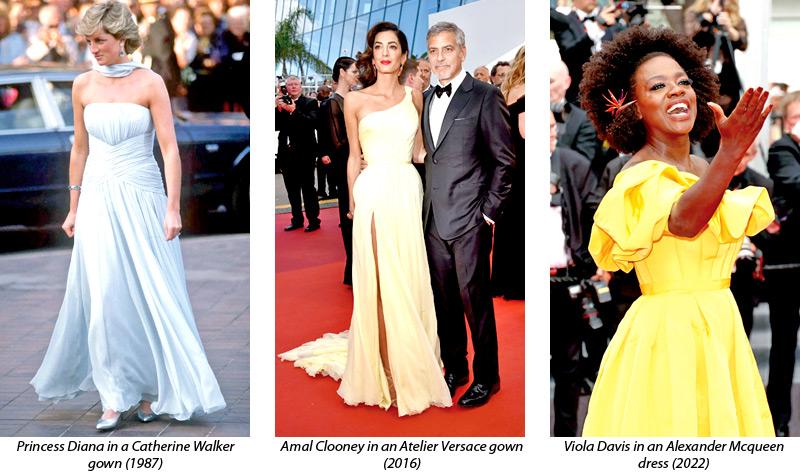
This year, the Cannes International Film Festival was held in Cannes, France from May 16 to May 27. This year marked its 27th edition.
Ruben Ostlund was the president of this year’s Jury.
The first prize, the ‘Palme d’Or’ award was won by “Anatomy of a Fall”, directed by Justine Triet. Justine Triet’s “Anatomy of a Fall” is considered to have marked a rousing and stirring leap and boost for a film director who is worthy of broader global recognition and acceptance.
Dazzling and glamorous Sandra Huller acting the character of German novelist accused of murdering her husband in “Anatomy of a Fall” which is the second entry from Triet following 2019’s ‘Sibyl’ is an intriguing and enthralling rich drama. Cannes is unique and boosts on days of yore of making amusements and merriment in bringing out spellbinding and enthralling style moments.
Cannes reminds you of dazzling and alluring moments right across its previous years where Lady Diana Spencer’s 1987 Catherine Walker gown that made the onlookers spellbound is still supposed to be the most charismatic and flashy moment of fashion throughout the history of Cannes.
Once you set your memory on the recent years of Cannes, Viola Davis’s 2022 Alexander Mcqueen dress, the feathered black gown, worn by Naomi Campbell at 2022 Cannes, designed by Valentino Haute Couture and Amal Clooney’s sunny Atelier Versace gown in 2016 dazzled the domain of Cannes fashions among many fashion icons making the waves.
Cannes is neither a capital city nor anywhere near to the significance of a capital city. However, it has been the venue for one of the most prestigious cinema festivals in the world. With the Lumiere brothers becoming the first to present projected moving pictures for a paying audience in December 1895 in Paris, its significance of being the capital city of France also became the talk of the day.
However, the festivities and the celebrations with often discussions on cinema, Cannes for no reliable reasons, became one of the most sought after destinations for lavish and extravagant fashions and movies. With a predominantly Mediterranean climate, Cannes enjoys warm and hot summers and tender and gentle winters with moderate rainfall right across the autumn season.
It is said that the Cannes Film Festival remained as a form of an indirect consequence of the escalation of fascist regimes in Europe, notably during the 1930s. However, the roots of the Cannes film festival run back to the year 1932 with its first competitive international film festival held in Venice, Italy.
During that time, the ‘Mostra di Venezia’ was considered as the national fame and dignity of the countries which participated in the film festival.
Over the 30s, it was noticed that the official selection and the parties that won the prizes openly demonstrated their interest and concern on the countries which comprise the fascist alliance, notably Germany and Italy. The year 1938 was rather decisive for Cannes where “La Grande illusion” by Jean Renoir was overlooked for the top prize of the festival, the Coppa Mussolini (Mussolini Cup), inspite of being the most favourite amongst the members of the Jury and the moviegoers alike. Instead of that, the films from Italy and Germany were allotted in tandem with the Coppa.
It was also reported that “Olympia”, a German film was commissioned by Joseph Goebbels in order to document the brutal success of the Nazis at the 1938 Berlin Olympics; as well as “Luciano Serra Pilota”, an Italian film had been directed under the supervision of Mussolini’s son.
By the time the Jury announced its decision, the French were enraged and exasperated, and they withdrew their participation from the festival. The jurors of the United States and Great Britain resigned from their positions as a token of protest of the idea that ideology and politics could inscribe, imprint and stamp elsewhere in the aesthetic, creative and artistic expressions, interpretations, and utterances.
“La Grande Illusion” which was at first blush an anti-war film was after while disallowed in Germany and Italy, with Goebbels himself labelling it as “Cinematic Public Enemy No -1”.
Later on, an umbrella of moviemakers and critics gathered in Paris to suggest the then French government to underwrite the expenses of running an alternative film festival in Francein which it was deemed for the films to compete where no censorship and political bias remained.
As per some reports, albeit at the very outset of the request, there prevailed a lukewarm consideration; eventually the festival got its greenlight.The victorious team was found looking for an ideal location in order to host the festival.
At the outset, there were several suggestions for the cities. However, the ultimate suggestion was set either with Biarritz on the Atlantic Coast or Cannes on the Mediterranean.
According to the protocol, it was the city’s “radiant, glowing, alluring and appealing location” that settled it for Cannes. Whatever the facts may be, as commented by a considerable number of critics, the exact reason behind the selection of Cannes as the venue for the festival is the fact that unlike in Biarritz, the municipal authorities in Cannes had expressed their willingness to cough up the dough to make a strong and committed venue for the film festival.
